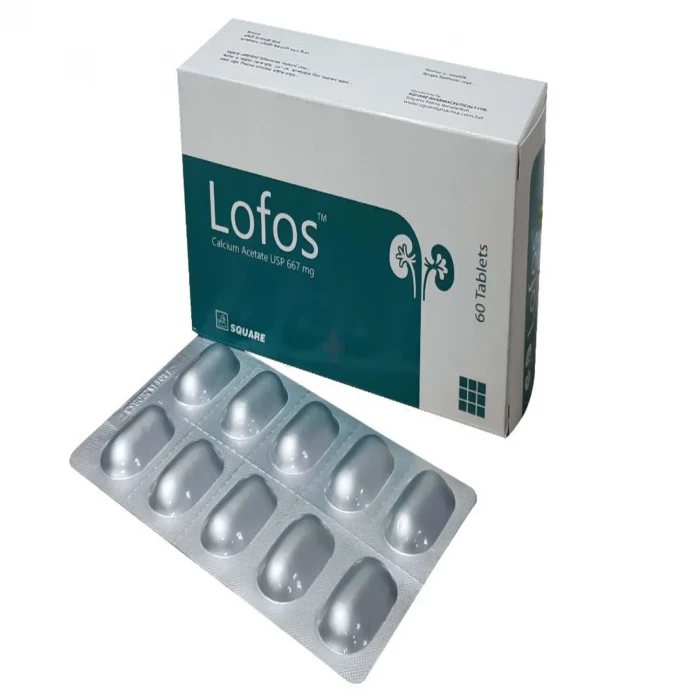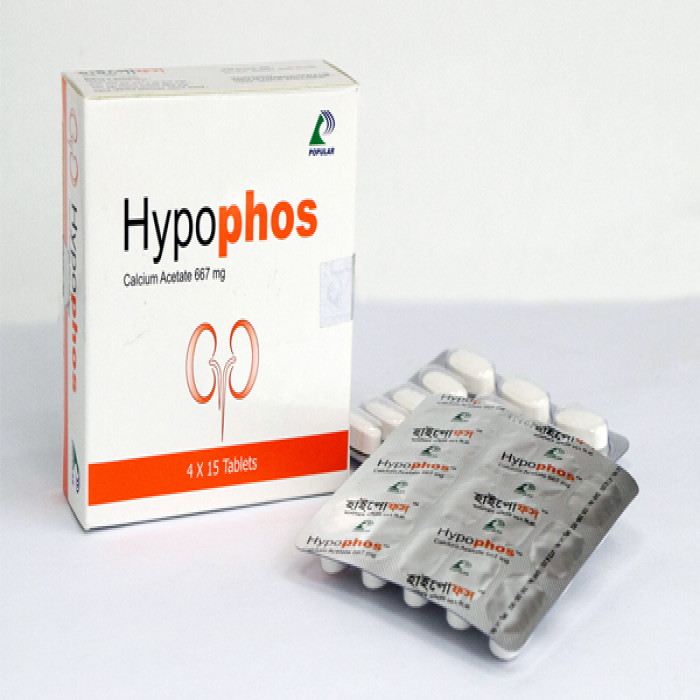
✔ 100% Authentic Product
👁️ Currently Viewing 1952
100% Genuine Products, Guaranteed
Safe & Secure Payments, Always
Fast, Secure & Efficient Delivery
Proper Packaging
 Cash on Delivery - All over Bangladesh
Cash on Delivery - All over Bangladesh Regular Delivery - 12-24 Hours, Dhaka City*
Regular Delivery - 12-24 Hours, Dhaka City* Regular Delivery - 24-48 Hours, All Over Bangladesh*
Regular Delivery - 24-48 Hours, All Over Bangladesh* ফ্রি ডেলিভারিঃ - ৯৯৯ টাকা+ অর্ডারে, ঢাকা
শহরে
ফ্রি ডেলিভারিঃ - ৯৯৯ টাকা+ অর্ডারে, ঢাকা
শহরে ফ্রি ডেলিভারিঃ - ২৯৯৯ টাকা+ অর্ডারে, ঢাকার
বাহিরে
ফ্রি ডেলিভারিঃ - ২৯৯৯ টাকা+ অর্ডারে, ঢাকার
বাহিরে
✅ Description:
Indications of Lofos Tablet
Calcium acetate is used to treat hyperphosphatemia and manage hyperphosphatemia in patients with end-stage renal failure.
Pharmacology of Lofos Tablet
When calcium acetate is consumed with food, it reacts with dietary phosphate to generate calcium phosphate, which is insoluble and eliminated in the stool. Treatment with phosphate binders is generally regarded as clinically appropriate if serum phosphorus remains below 6.0 mg/dl. At neutral pH, calcium acetate is extremely soluble, making calcium readily available for phosphate binding in the proximal small intestine. Orally administered Calcium Acetate from pharmaceutical dosage forms has been shown to have a systemic absorption rate of up to 40% when fasting and up to 30% when not fasting. This range includes data from both healthy and unhealthy sutures.
Dosage & Administration of Lofos Tablet
Adult: Initially 3-4 g daily. Usual range: 6-12 g daily.
To control hyperphosphataemia in chronic renal failure: Initially 1.334 g (338 mg of calcium). May increase dosage gradually according to serum phosphate conc, provided hypercalcemia does not occur.
Interaction of Remophos Tablet
Calcium Acetate may decrease the bioavailability of tetracycline.
Contraindications
Calcium Acetate is contraindicated in patients with hypercalcemia.
Side Effects of Lofos Tablet
Patients have experienced nausea during Calcium Acetate medication in clinical investigations. During treatment with Calcium Acetate, hypercalcemia might arise. Mild hypercalcemia (Ca > 10.5 mg/dl) can go unnoticed or cause constipation, anorexia, nausea, and vomiting. Confusion, delirium, stupor, and coma are all symptoms of severe hypercalcemia (Ca>12 mg/dl). Calcium Acetate's long-term effect on the advancement of vascular or soft-tissue calcification has yet to be determined. Pruritus has been recorded in isolated cases, which could be allergic reactions.
Pregnancy & Lactation
Calcium acetate has not been used in animal reproduction studies. Calcium Acetate has not been studied to see if it can harm a fetus or impact reproduction capacity when given to a pregnant woman. Only provide calcium acetate to a pregnant lady if it is really necessary.
There are no good studies on women to determine the harm to an infant when the drug is taken while breastfeeding. Before taking this drug during breastfeeding, weigh the potential advantages against the potential hazards.
Precautions & Warnings
When calcium is provided with meals to patients with end-stage renal failure, they may develop hypercalcemia. Calcium Acetate should not be taken with any other calcium supplements.
Storage Conditions
Store at room temperature in a cool, dry location. Light, heat, and moisture should all be avoided.
⚠️Disclaimer:
At ePharma, we’re committed to providing accurate and accessible health information. However, all content is intended for informational purposes only and should not replace medical advice from a qualified physician. Please consult your healthcare provider for personalized guidance. We aim to support, not substitute, the doctor-patient relationship.









